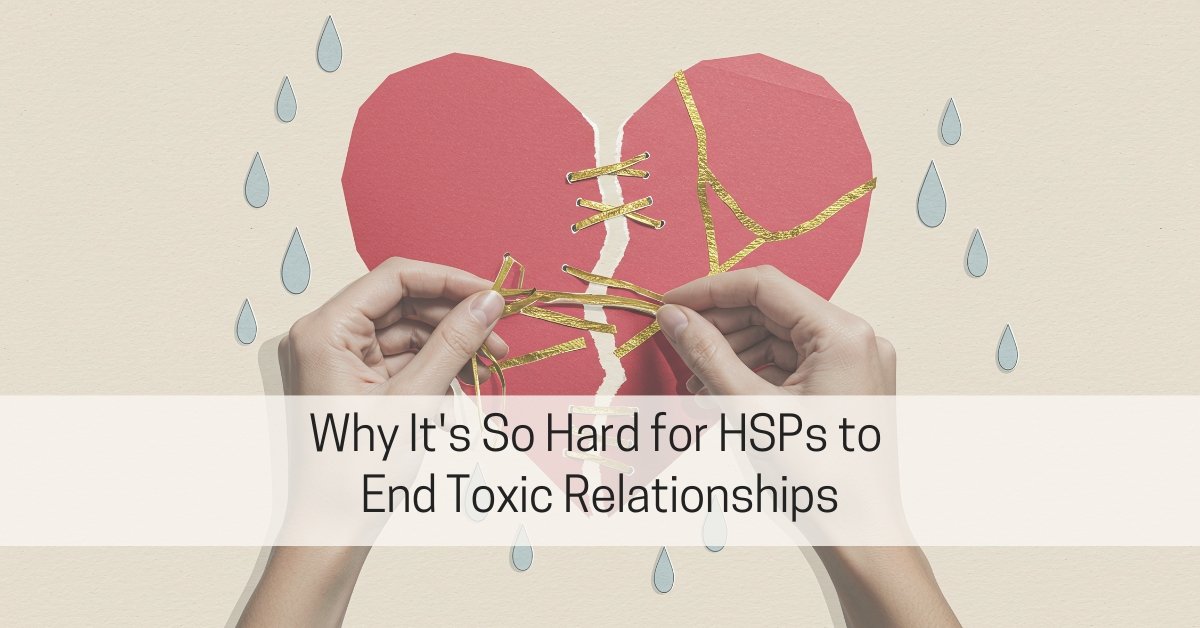As a highly sensitive person (HSP), toxic relationships can feel impossible to escape. This article explores the complex reasons why HSPs stay in toxic relationships and how you can break the cycle while remaining true to yourself and your sensitive nature.
If you’re a highly sensitive person like me, you probably process sensory input, emotions, and experiences more deeply than the average person. This heightened sensitivity often increases empathy, emotional awareness, and strong reactions to stimuli. While these qualities can be an asset, they can also make it difficult to leave toxic or abusive relationships—not because we’re weak or incapable, but because our sensitivity can work against us in harmful situations.
What Is a Toxic Relationship?
A toxic relationship is characterized by persistent behaviors that emotionally, and sometimes physically, harm you. Common behaviors include manipulation, control, constant criticism, lack of respect, and gaslighting, and the toxic person typically is unwilling to change or acknowledge the harm they’ve caused.
If you’re in a toxic relationship, you may feel anxious, drained, isolated, and have low self-esteem, often feeling like you’re “walking on eggshells.” This differs from a healthy relationship, which is built on mutual respect, trust, open communication, and support, where both people feel safe, valued, and empowered.
Why Ending a Toxic Relationship Is Harder for HSPs
Many people find it difficult to end toxic or abusive relationships, but HSPs often face some unique challenges for the following reasons:
- Deep Empathy and Compassion: HSPs are naturally empathetic; we often feel other people’s emotions intensely. This empathy can make it hard to walk away, especially if you feel responsible for or care about the other person’s well-being.
- Fear of Conflict: Many HSPs are conflict-averse because we’re deeply affected by tension and negativity. The thought of confrontation or hurting someone else may be overwhelming, leading you to minimize problems and stay in a toxic relationship to avoid conflict.
- Emotional Overwhelm: HSPs process experiences and emotions deeply, making relationship issues more intense. This can lead to second-guessing your decision or ruminating on whether they’re making the right choice, which keeps you stuck. The emotional toll of a toxic relationship may also leave you too drained to take action.
- Desire to Fix and Please: HSPs often believe that with enough effort or understanding, they can heal the relationship. You may focus on the abuser’s potential, clinging to small moments of kindness or promises of change, which can make it hard to leave. You may also feel a strong need to please others, and the fear of disappointing them can make it difficult to prioritize and assert your needs.
- Deep Attachments: HSPs tend to form strong emotional attachments, even in unhealthy relationships. This loyalty can make staying feel like an obligation rather than a choice.
- Low Self-Worth: In emotionally abusive relationships, HSPs may internalize criticism, leading to feelings of unworthiness or guilt for wanting to leave and a belief that they deserve mistreatment. Manipulation and gaslighting can also cause you to doubt your feelings and accept blame or the abuser’s version of events.
- Anxiety About the Future: The uncertainty of what comes after the relationship ends can feel paralyzing. HSPs are often sensitive to change, which can make you afraid of the unknown and reluctant to make changes, even when they’re in your own best interest.
How HSPs Can Heal and Move Forward from a Toxic Relationship
The following strategies are adapted from my book, Cutting Ties with Your Parents (New Harbinger 2024) and are designed to address the specific needs of sensitive individuals, focusing on building emotional resilience, setting and maintaining firm boundaries, and overcoming the guilt and self-doubt that can keep you stuck. With the right support and tools, it is possible to prioritize your well-being and break free from unhealthy relationships.
- Acknowledge and validate your feelings: It’s okay to feel guilty, ashamed, confused, or overwhelmed. Try not to suppress them, but instead, acknowledge them and allow yourself to feel them. Our feelings can be particularly intense and prolonged due to our heightened sensitivity. Therefore, allow yourself the time and space to process them without rushing. For instance, try journaling about specific emotions, use mindfulness to observe your feelings without judgment, and allow yourself to cry or express emotions physically in a safe space.
- Set boundaries: For HSPs, boundaries are crucial for managing both emotional and sensory overload. You may benefit from limiting time with difficult or critical people, saying no to obligations and invitations that drain you, and reducing exposure to bright lights and loud noises. In my experience, the most effective boundaries are compassionate, clear, and consistent. You can do this by being direct about what you need, using a polite tone, and restating or reinforcing your boundaries, if necessary. Tools such as putting your phone on do not disturb, blocking texts from chronic boundary violators, and using noise-canceling headphones in overwhelming environments can also be helpful boundaries.
- Challenge guilt and shame: Abusers often blame their victims, making them think they’ve done something wrong or deserve mistreatment. Try challenging guilt and shame by imagining that a dear friend is in a relationship just like yours. Ask yourself if it would be wrong or selfish for your friend to set boundaries, prioritize their well-being, or end the relationship. In addition, recognize that the critical voice you hear is often the internalized voice of your abuser, not a reflection of reality.
- Increase self-care: Self-care, including healthy habits and restorative practices, can also help you sustain your energy during challenging times. For example, spending time in nature can be incredibly restorative for sensitive individuals. Furthermore, engaging in creative activities like painting, writing, or playing music can help process emotions. Also, prioritize restorative sleep and naps as HSPs are more easily fatigued and trauma and healing can drain your energy.
- Seek support: Support is integral to healing as it can decrease isolation, improve mood, teach coping skills, and offer hope. However, HSPs need to connect with others in ways that feel manageable and authentic. So, consider what kind of support you need and what form it might take. For example, some benefit immensely from support groups, while others feel more comfortable with one-on-one support.
- Treat yourself with compassion: Be kind and gentle to yourself; you’ve been through a lot! Recognize that healing from unhealthy family patterns is not a linear process and setbacks are normal. Therefore, be patient with yourself and celebrate your progress, no matter how small.
Conclusion
Leaving a toxic or abusive relationship is a courageous act, especially for highly sensitive individuals. Remember that your sensitivity, while it may have contributed to the challenges you face, is also a strength. As a therapist working with HSPs, I’ve seen the incredible resilience and capacity for healing we possess. By understanding the unique ways you’re affected by abuse as an HSP and utilizing the strategies outlined above, you can begin the journey of healing and reclaiming your self-worth. Be patient with yourself, seek support, and know that you deserve healthy and fulfilling relationships.
©2025 Dr. Sharon Martin, LCSW. All rights reserved. Photos courtesy of Canva.com.
Learn More
Learn more about how to change codependent behaviors
Navigating the Codependency Maze provides concrete exercises to help you manage anxiety, detach with love, break through denial, practice healthy communication, and end codependent thinking. It was written by Sharon Martin, a psychotherapist with over 20 years of experience helping people overcome codependency, people-pleasing, and perfectionism and find their way back to themselves. For more info and to view sample pages, click HERE.
Publisher: Source link





